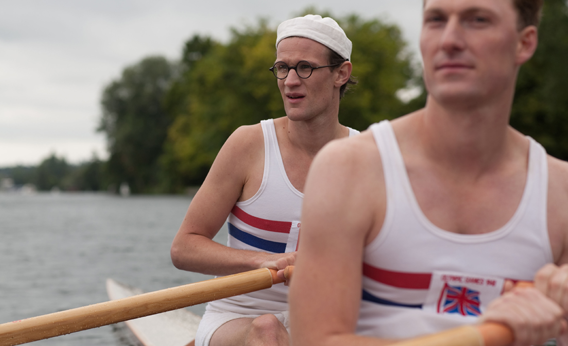Going for Gold—The ’48 Games, which airs Wednesday night on BBC America, is a sort of Chariots of Fire with rowboats. It tells the story of Bert Bushnell (Matt Smith, better known these days as the Eleventh Doctor) and Dickie Burnell (Sam Hoare), who represented Great Britain in the double sculls event at the 1948 London Olympics.
Bert and Dickie were a chalk-and-cheese pair. Bert, the middle-class son of a boat builder, is unimposing and bespectacled; Dickie, a former captain of boats at Eton and an Oxford blue, is a perfect specimen, confident and accomplished. Bert rides a bike; Dickie drives a luxury motor. They’re brought together just five weeks before the games by Jack Beresford (James Frain), who medaled in five consecutive Olympics and won gold in front of Hitler at the 1936 Berlin Games. Beresford is a man with a vision of a meritocratic Olympic team, in which the best rowers are paired together, even if that means Dickie must ditch his longtime boat mate and Bert must put up with a toff in the front seat.
Although Going for Gold includes the requisite number of training montages, writer William Ivory has focused the five stages of the sporting biopic—conflict, insight, reconciliation, setback, triumph—on the class conflict between the two leads rather than competition with other nationalities. Bert is driven by a nonstop series of personal insults—although he will represent his country in the Olympics, he is forbidden from entering the rowing team’s Leander Club headquarters through the front door, because he isn’t a member. The pair’s big breakthrough comes after a blazing row, in which Dickie tells Bert: “Rather than blaming the silver spoon you forever see in my mouth, you [should] take a look at the chip on your own shoulder. And ask yourself, honestly, whether it and blind ambition are really enough in themselves to make a good oarsman.” It’s the worst dialogue of the movie, but at least thereafter we’re spared more studies in contrast between the two men’s status and circumstances.
After that, the focus shifts to their commonalities: They both have daddy issues. Bert’s old man is a frustrated athlete who drives his son mercilessly because he had to give up his own Olympic dreams when he could no longer afford to retain his amateur status. Dickie’s father, who won rowing gold in the 1908 London Games, represents the old guard, showing up at regular intervals to remind his son that rowing is a gentleman’s sport and to tut-tut Dickie’s training regimen or accuse him of “showboating” when Bert and Dickie win a race by what he deems an excessive margin.
Because stories of sporting triumph follow such a familiar arc, the film’s most compelling scenes come not on the Thames but in the Cabinet Room, where politicians struggle to convince Prime Minister Clement Attlee that beat-up postwar Britain can succeed in mounting such a high-profile international event. When the final credits note that the London Games produced a profit of £29,000, that result seems more worthy of celebration than Bert and Dickie’s sporting exploits. More moving still are the glimpses of Austerity Britain, where rationing and food shortages mean that even Olympic athletes sometimes go hungry. The most tear-jerking moments come when the proud Brits who have sacrificed their own meager rations to feed the American rower billeted with them see the contents of the food parcel he delivers, packed with steaks, rice, cheesecakes, and bananas—food they haven’t seen for years, if ever.
When NBC televises the 2012 London Olympics, I hope they minimize the behind-the scenes stories of training traumas and sick relatives and instead show us the darned sports. But here, while the rowing is exciting enough, the tales of hardship and family drama are emotional gold. I hope Bob Costas doesn’t get any ideas.
